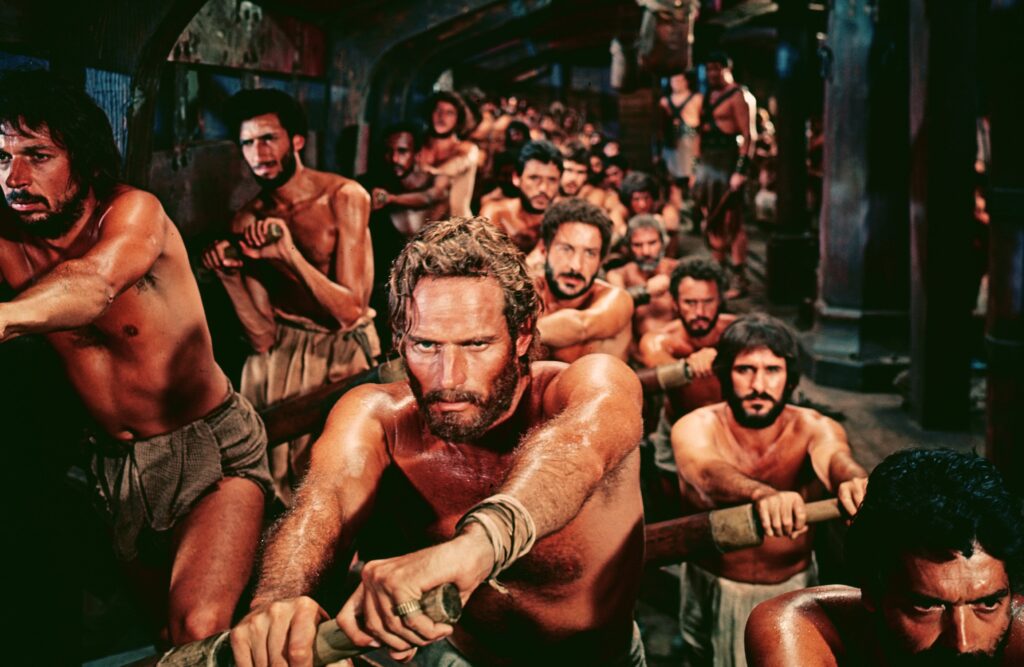
Ben-Hur (1959): A Timeless Epic of Revenge, Redemption, and Faith
William Wyler’s Ben-Hur (1959) is one of the greatest epics in cinematic history, a film that seamlessly blends breathtaking action, deep human drama, and profound spiritual themes. Based on Lew Wallace’s 1880 novel Ben-Hur: A Tale of the Christ, this monumental film won a record-breaking eleven Academy Awards, including Best Picture, cementing its legacy as a Hollywood masterpiece. With its iconic chariot race, grand historical scope, and Charlton Heston’s powerful performance, Ben-Hur remains an unforgettable cinematic experience.
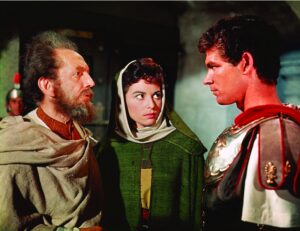
A Story of Betrayal and Vengeance
Set during the time of Christ, Ben-Hur follows the journey of Judah Ben-Hur (Charlton Heston), a wealthy Jewish prince in Jerusalem. He is betrayed by his childhood friend, Messala (Stephen Boyd), a Roman officer who has embraced the ruthless power of the empire. When an accident during a Roman procession leads to Judah’s family being falsely accused of treason, Messala condemns him to the brutal life of a galley slave and imprisons his mother and sister.
This act of betrayal sets Judah on a path of vengeance. Through sheer will and resilience, he survives years of suffering and eventually earns his freedom, thanks to the noble Roman consul Quintus Arrius (Jack Hawkins), who adopts him as a son after Judah saves his life during a naval battle. Now a man of power and status, Judah returns to Jerusalem with one goal: to confront Messala and seek justice.
The Legendary Chariot Race
One of the most famous sequences in film history, the chariot race is the heart of Ben-Hur. Filmed with unprecedented realism, it took five weeks to shoot and remains one of the most thrilling action scenes ever captured on film. The intensity of the race, with its practical effects and real stunts, heightens the personal stakes between Judah and Messala. Their fierce rivalry culminates in a brutal, unforgettable contest where Judah emerges victorious, while Messala meets a gruesome end.
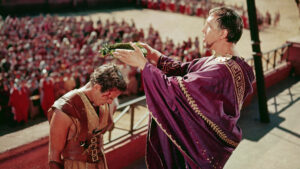
Messala’s dying words are haunting—he reveals that Judah’s mother and sister, long thought dead, are alive but have been afflicted with leprosy. Even in death, Messala’s cruelty leaves a scar on Judah’s soul, further fueling his inner turmoil.
A Journey Toward Redemption
While revenge drives Judah for much of the film, his encounter with Jesus Christ introduces a deeper, spiritual element. Throughout the story, Jesus appears in pivotal moments, offering silent compassion and guidance. When Judah finally finds his mother and sister in a leper colony, his desire for vengeance begins to wane, replaced by a yearning for peace and healing.
The film reaches its emotional climax during the crucifixion of Jesus. As Judah witnesses the suffering of Christ, he experiences a profound transformation. The miracle of his mother and sister’s healing symbolizes his own redemption, showing that forgiveness and love are stronger than hatred and revenge. This powerful resolution elevates Ben-Hur beyond a mere historical epic, making it a deeply moving spiritual journey.
Charlton Heston’s Iconic Performance
Charlton Heston’s portrayal of Judah Ben-Hur is one of the most commanding performances in cinema. His physical presence, emotional depth, and ability to convey both fury and vulnerability make him the perfect leading man for such a grand story. Heston’s performance earned him an Academy Award for Best Actor, and his portrayal of Judah remains iconic to this day.
Stephen Boyd’s Messala is a worthy adversary, embodying both charisma and cruelty. His transformation from Judah’s friend to ruthless oppressor adds emotional weight to the story, making their eventual confrontation all the more gripping.
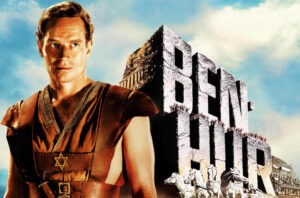
William Wyler’s Masterful Direction
William Wyler, known for his meticulous attention to detail, crafted Ben-Hur with a balance of spectacle and intimate storytelling. Unlike many epics of its time, the film does not rely solely on grand set pieces but also focuses on character-driven drama. Wyler’s ability to blend action with deep emotional resonance ensures that Ben-Hur remains compelling even beyond its famous chariot race.
Cinematographer Robert L. Surtees captures the grandeur of ancient Rome and Jerusalem with breathtaking scope, while the film’s production design and costumes immerse the audience in its historical setting. The massive sets, constructed at Cinecittà Studios in Italy, contribute to the film’s authenticity and epic scale.
Miklós Rózsa’s Monumental Score
The musical score by Miklós Rózsa is another defining element of Ben-Hur. His sweeping orchestral compositions heighten the film’s grandeur and emotional impact. From the triumphant themes of victory to the somber, reverent tones accompanying the crucifixion, Rózsa’s music enhances every moment, making the film an even more immersive experience.
Themes of Faith, Forgiveness, and the Power of Christ
Ben-Hur is more than just a revenge epic; it is a film about faith, the power of forgiveness, and the impact of Christ’s teachings. Judah’s arc from bitterness to redemption mirrors the transformative power of grace. The presence of Jesus, though minimal in dialogue, looms large throughout the film, subtly guiding Judah toward a path of peace.
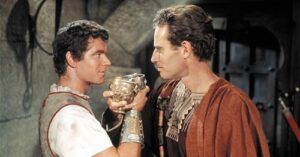
Unlike many biblical epics that overtly preach their messages, Ben-Hur allows its themes to unfold naturally through its storytelling. The film resonates with both religious and secular audiences, as its core message—choosing love over hatred—remains universal.
Watch Movie Here: https://youtu.be/NR1ZHKw09n8?si=nC3s5SQSIN6NTepO
Legacy and Influence
Ben-Hur set a new standard for epic filmmaking. Its influence can be seen in later films such as Gladiator (2000) and Braveheart (1995), both of which draw inspiration from its themes of personal struggle, vengeance, and redemption. The film’s groundbreaking action sequences paved the way for modern spectacle-driven cinema, while its emotional depth continues to set it apart from many of its contemporaries.
Even decades after its release, Ben-Hur remains a towering achievement in film history. Its blend of action, drama, and spiritual themes ensures its place among the greatest films ever made.
Conclusion
Ben-Hur is a cinematic triumph that continues to captivate audiences with its thrilling action, unforgettable performances, and powerful message of redemption. William Wyler’s direction, Charlton Heston’s iconic performance, and Ennio Morricone’s magnificent score create an epic that transcends its historical setting. More than just a revenge tale, it is a profound exploration of the human spirit, a film that reminds us of the enduring power of faith, forgiveness, and love. Over 60 years since its release, Ben-Hur remains one of the most awe-inspiring achievements in film history, a timeless classic that will continue to inspire generations to come.




